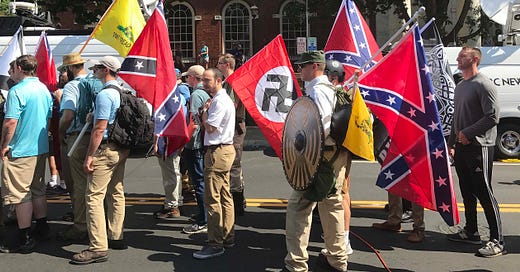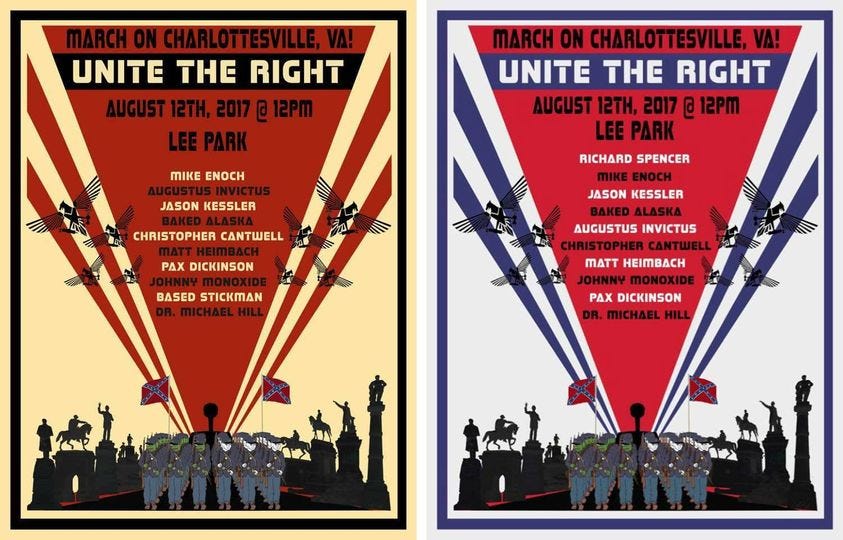“Very fine people”: One last time
Like Trump thinking George Washington “probably didn’t” own slaves, there is a known answer
It’s hard to believe that, all these years later, we’re still litigating the question “Did President Trump call White nationalists ‘very fine people’?” As it happens, this time around Trump’s recent remarks on another subject offer a fresh way of approaching the subject: Last week, with typically blithe indifference to reality, Trump announced that, while “they thought” that George Washington owned slaves, “actually I think he probably didn’t.”
In fact, of course, the well-established historical reality is that George Washington was definitely a slave owner. A conflicted slave owner, perhaps; a man who came to find himself in the uncomfortable position of being both an abolitionist in theory and a slave owner in practice: but a slave owner to the end, freeing his slaves only in his will upon his death. What Trump may profess to “think” is “probably” the case does not change known reality.
In much the same way, the historical reality is that the August 2017 Unite the Right rally was in fact a neo-Nazi White-supremacist rally. That’s what it was (documentation below). Trump, in his third public statement on the rally and in subsequent comments, has sought to recast the nature of the controversy as simply conflicting demonstrations over a statue of Confederate General Robert E. Lee, but this is like “opining” that Washington wasn’t a slave owner; it doesn’t change reality.
The short answer, then, is: Yes, Donald Trump called White nationalists very good people. The slightly more complicated answer is that Trump called people who were in fact White nationalists “very fine people” while pretending or imagining that some people on the “side” of the rally weren’t White nationalists. In some alternate reality where the August 2017 Unite the Right rally was a fundamentally different event—not a neo-Nazi White-supremacist event—in which very fine people could and did participate in good conscience, it would be fair to say that, because Trump said that “the neo-Nazis and White nationalists … should be condemned totally,” his comment about “very fine people” could not be construed as applying to them.
However, Trump’s blithe indifference to reality does not change the realities he talks about, or the implications of his words in the real world. That is why Snopes’s strained attempt to offer a narrow judgment in Trump’s favor is unrealistic, and why critiques of Snopes’s fact check have the more responsible take.
The rest is commentary.
Commentary (1): Notes on the rally
Unite the Right was the third white-identity demonstration at Charlottesville within four months, following rallies led by neo-Nazi Richard Spencer in May and by the KKK in July — all around the same statue. Anyone following debate around the statues would have had a very good idea what to expect from Unite the Right.
The Unite the Right rally organizer, Jason Kessler, is a neo-Nazi, white supremacist and anti-semitic conspiracy theorist who was kicked out of the Proud Boys for his racist views. (The Proud Boys are self-described “Western chauvinists” who are pro-Trump and pro-Southern culture, but officially disavow racism.)
The marketing materials produced for the rally utilize imagery and designs with clear Nazi associations.
What about the advertised speakers for this event? I’m no expert in this area, but several years ago, responding to queries on social media, I did a little Googling. Among my findings:
Baked Alaska is known, according to Gizmodo, for retweeting “videos of his friends saying that ‘Hitler did nothing wrong’“ and “images of people in gas chambers.” He talks a lot about “white genocide.”
Shock jock Christopher Cantwell tepidly endorsed Trump for president, complaining that he would have preferred a candidate “a lot more racist than Donald Trump” who “does not give his daughter to a Jew.” He was a little blunter in a more recent interview: “Let’s f---ing gas the kikes and have a race war.”
Pax Dickson is the most seemingly mainstream name on the flyer. He wrote for Business Insider a few years ago but was forced out due to derogatory tweets about women and feminism. I don’t know much about him; his willingness to appear alongside the other people listed here is the worst thing I know about him.
Neo-Nazi Mike Enoch has a podcast called The Daily Shoah (yes, you read that right). Every time you see someone with triple parens around their names, you’re witnessing one of Enoch’s contributions to contemporary cultural dialogue.
Matt Heimbach is the founder of a group that advocates the creation of a white separatist ethnostate. Unlike Spencer, Heimbach has no problem aligning with violent ideologies as long as the violence is directed against “race-mixers, homosexuals, abortionists and Jews.”
Dr. Michael Hill is the co-founder president of the League of the South, a “Southern secession” group. He is an explicit white supremacist who defends slavery.
Johnny Monoxide (such a wholesome nom de plume!) is a frequent contributor to The Daily Shoah.
Augustus Sol Invictus (right, he’s got a neopagan thing going on—like the Nazis) is a Holocaust denier and a promoter of eugenics.
Richard Spencer advocates a “peaceful ethnic cleansing” and the creation of a white separatist ethnostate. This makes him more peaceful than some of his fellow speakers — but not too peaceful to be unwilling to be featured alongside them.
Which is the key point. No one who regarded antisemitic violence as appalling and abhorrent would appear on a panel with violent antisemites. No one who regarded Nazis as anathema would march alongside Nazis.
For example, despite having been kicked out of the Proud Boys, Kessler nevertheless invited Proud Boys founder Gavin McInnes to participate. McInnes declined, citing his unwillingness “to be associated with explicit neo-Nazis.” I’m not suggesting that McInnes is a “very fine person”—but his action in this case was the only conceivable action that a very fine person could take.
Is it possible that some non-racist Civil War monument fans, not knowing the nature of the rally or of the featured speakers, and ignorant of the two previous white identity rallies around the statue in recent months, innocently showed up to defend Southern heritage? While I’ve seen no evidence of this, certainly it would be very hard to prove the contrary.
Certainly any very fine people in attendance on Friday, August 11, must have been appalled at the overtly antisemitic slogans of “Jews will not replace us” and the Nazi slogan “Blood and soil” being chanted by marching demostrators. If they were there on Saturday, August 12, they would have been horrified by posters targeting Jews like “the Goyim know” and “the Jewish media is going down.” If they heard any of the featured speakers, they must have realized what they had walked into.
If they were indeed “very fine people,” they would have done the only thing possible: They would have had nothing to do with this White nationalist hatefest. They would have departed as quickly as possible. Again, no one, to my knowledge, has shown that very fine people did innocently show up. I certainly haven’t heard about any would-be Civil War monument demonstrators beating a hasty retreat from the rally.
Commentary (2): Notes on Trump’s statements
Is it possible that Trump was simply unclear on the facts? That he hadn’t been fully briefed on the nature of the event, or hadn’t had time to gather the relevant facts? Let’s review what Trump said and when he said it. The president issued three responses to Charlottesville over four days: on Saturday, August 12; on Monday, August 14; and on Tuesday, August 15.
His first statement, on Saturday, we might charitably hope was the kind of not entirely informed statement some of his defenders have supposed. This was the statement where he blamed bigotry and violence “on many sides.” Backlash to this statement over the next two days was tremendous. So on Monday Trump issued a second response, a prepared speech (written for him, obviously, in damage-control mode, with input from his handlers and advisors) in which he unequivocally condemned racism, white supremacists and neo-Nazis.
By the time this second statement was issued on Monday, one would hope and expect that Trump or at least his advisors would have made it their business to ensure that the president was adequately informed on this issue and specifically on the nature of the rally in Charlottesville, based on two days of backlash in response to the first statement.
But then the next day, on Tuesday, Trump issued a third statement reverting to and defending his original statement. It was in this third statement that Trump made the remark about “very fine people” on both sides. Ironically, in this third statement he also referred twelve times to the importance of getting or knowing “the facts.”
Asked why he waited until Saturday to make his first statement, Trump replied:
I wanted to make sure, unlike most politicians, that what I said was correct. Not make a quick statement. The statement I made on Saturday, the first statement, was a fine statement. But you don’t make statements that direct unless you know the facts. It takes a little while to get the facts. You [journalists] still don’t know the facts. And it’s a very, very important process to me. And it’s a very important statement. So I don’t want to go quickly and just make a statement for the sake of making a political statement. I want to know the facts…
Later he said:
When I make a statement, I like to be correct. I want the facts. This event just happened. In fact, a lot of the event didn’t even happen yet, as we were speaking. This event just happened. Before I make a statement, I need the facts. So I don’t want to rush into a statement…But unlike you and unlike the media, before I make a statement, I like to know the facts.
He went on and on and on like this, about the importance of knowing the facts, and how he waited until Saturday to be sure of getting the facts and making a correct statement.
Again, this was on Tuesday, after the backlash to his Saturday statement, and after making the second statement unequivocally condemning racism, white supremacists and Nazis. And it was in this third statement that he said “you also had people that were very fine people on both sides.”
So, at that point, after two days of backlash to his first statement, after the second, scripted statement, and after all his bragging about the importance of getting the facts for this Saturday statement, Trump clearly had every reason to know the truth about who he was calling “very fine people.”







This was much worse than I knew. The event so appalling, and DJT what? Ignorant? Stupid?
Trump doesn't really harbor anything like what we would conventionally call racism. He really isn't that different than Hillary... a New York style liberal. Good evidence of this can be seen in his quite tolerant acceptance of sexual deviancy and their associated lobby.
His real character flaw consists in his pandering and absolute lack of moral principle on any matter other than what will elicit press coverage and attention.
The fact that he has attracted so many Christians who apologize for him and make excuses for him is traumatic but helpful. It certainly is separating the sheet from the goats.